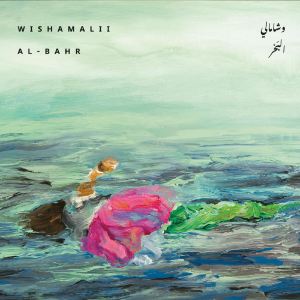 The Finland based multi-cultural trio Wishamalii makes powerful and beguiling music that seamlessly blends genres. World renowned Finnish piannist Kari Ikonen joins with Palestinian-Jordanian singer, composer and oud virtuoso Nemat Battah, and Ethopian percussionist Abdissa “Mamba” Assefa on this soulful collection of songs that center ongoing Middle Eastern conflicts and the plight of refugees and immigrants.
The Finland based multi-cultural trio Wishamalii makes powerful and beguiling music that seamlessly blends genres. World renowned Finnish piannist Kari Ikonen joins with Palestinian-Jordanian singer, composer and oud virtuoso Nemat Battah, and Ethopian percussionist Abdissa “Mamba” Assefa on this soulful collection of songs that center ongoing Middle Eastern conflicts and the plight of refugees and immigrants.
“Our theme for this album is peace – and the desperate, constant hope and appeal for it. We want to highlight the difficult feelings and life paths of immigrants who wonder if the world will ever experience peace?” the band writes in the liner notes.
I was previously familiar with Kari Ikonen from his 2015 trio release Beauteous Tales and Offbeat Stories which featured Ikonen on piano, Markku Ounaskari on drums and Armenian bassist Ara Yaralyan. “This album is about equal parts upbeat, sometimes swinging jazz, icy Nordic soundscapes, and pensive, occasionally dark excursions into modernist interpretations of European folk music,” I said in that review.
Al-Bahr is in a similar league as that recording, but with an entirely different feel largely due to Nemat Battah’s impassioned vocals and the Mediterranean vibe that comes from her oud. Also, Ikonen divides his focus between a straight acoustic piano and a piano that he modifies with his own invention, the “Maqiano Microtuning System,” which allows him to play the Arabic maqams normally played on a harp. When I first heard this on the second track “Impressions of Deir al Balah” I assumed it was a Turkish or Armenian qanun, a zither much like a hammer dulcimer.
Three adventurous musicians of diverse cultural backgrounds give this album its charge. That and the overarching theme of the music, which is the tensions between Europe and the Middle East, immigration, and the horrors that so often accompany stories of today’s migrants. The title song “Al-Bahr” (The Sea) is a dark, sorrowful lament about the way the Mediterranean has become a graveyard for war’s refugees, composed by Ikonen with lyrics by Jordanian musician Ra’ad Al-Zaben. Ikonen’s immediately recognizable piano solo beautifully echoes Battah’s emotive vocals.
The same can be said of the rest of this short but high impact album, from the meditative, percussive opener “Wallathi Wallaka Qalbi” through the dervish-like celebratory closer “Salla Fina,” with analog synth doubling Ikonen’s piano and then soaring through a prog rock style solo. Especially notable is the historic song “Ya Dirati,” here given a ghostly atmosphere via synth and percussion; Battah’s mournful vocals deliver the tale of Syria’s betrayal by the Allies in the wake of WWII.
 The four musicians of Aylin’s Soulgarden create an innovative blend of Anatolian “Alevi” sounds with modern elements of pop, jazz, and electro. So of course first thing I had to do was look up Alevi. According to Wikipedia, it’s a Turkish sect of Islam that is neither Sunni nor Shia, with some elements that are similar to Sufism. I’m a big fan of Turkish psychedelia, and Aylin’s Soulgarden shares some of that music’s DNA, particularly the liberal use of analog synthesizers, but overall it has more of a feel of pop and indie folk-rock tossed in a blender with melodic Turkish songcraft.
The four musicians of Aylin’s Soulgarden create an innovative blend of Anatolian “Alevi” sounds with modern elements of pop, jazz, and electro. So of course first thing I had to do was look up Alevi. According to Wikipedia, it’s a Turkish sect of Islam that is neither Sunni nor Shia, with some elements that are similar to Sufism. I’m a big fan of Turkish psychedelia, and Aylin’s Soulgarden shares some of that music’s DNA, particularly the liberal use of analog synthesizers, but overall it has more of a feel of pop and indie folk-rock tossed in a blender with melodic Turkish songcraft.
The group coalesced out of the heady arts scene in the Bavarian city of Augsburg. Its members are Girisha Fernando (bass, guitar, production), siblings Aylin Yildirim (vocals) and Eren Yildirim (saz, tenbur), and Paul Etschberger on synths. Blending the Yildirims’ roots in the spiritual Alevi music with Girisha’s indie, jazz, and soul background and Etschberger’s pop leanings creates this unique and engaging sound that translates ancient texts into a very modern but rooted music.
The first thing that struck me about Bu Bir Demdir, other than the mildly psychedelic sounds of saz and synth, was the strong melodies in every song. To my ear they somehow combine very old modes with tunes brimming with modern pop hooks. Both “Ayrı Düşüren” and “Kevokim” are good examples of this; the former reminds me of early Madonna but in a minor mode, the latter more indie pop-rock with a hooky bridge and sing-along chorus.
“Güller açıldı” has a loping rhythm and clean electric guitar line that I associate with Malian desert blues, paired with a dream pop chorus that’s perfectly suited to Aylin’s husky, sultry vocals. The closer “Le Weso” lets Aylin really strut her stuff over a synth-heavy soul jazz arrangement that I find impossible to resist.
(Nordic Notes, 2024)
(CPL-Music, 2024)
